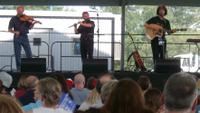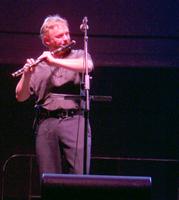
I've been a fan of the Tannahill Weavers since first hearing their "Lucy Cassidy" set on a RykoDisc sampler back in the late '80s, but I've been listening to their recordings with a bit of a new ear since taking up the tin whistle. But I'd never had the opportunity to see them perform live.
So I was delighted when I learned that they would be coming to the Dublin Irish Festival. I also requested an interview with the band, and Colin Melville soon agreed to spend some time discussing whistling in Scottish music; I've posted the interview separately. The band played three sets at the festival; I caught them on Saturday and Sunday.
The musicians in the Tannahill Weavers have changed over the band's 37 year history, but Roy Gullane (guitar, vocals) and Phil Smillie (simple system flute, whistle, bodhrán, vocals). Colin Melville (Highland bagpipes, Scottish smallpipes, whistles) is the most recent addition; he's been in the band for five years. Leslie Wilson (bouzouki, keyboards, vocals) and John Martin (fiddle, vocals) have both been in the band for over 15 years.
 I was wondering what a band with 14 full albums (not counting compilations) to its credit would play in concert, and it turns out that their taste is pretty similar to mine, as they played most of my favorite tracks! They played music from across the history of the band, including several spectacular sets of dance tunes like The Geese in the Bog / The Jig of Slurs and the Arnish Light set. I really like their new version of Cam' Ye By Athol; they first recorded it on Are Ye Sleeping Maggie, but rearranged it on Arnish Light to include a Highland bagpipes bridge. They played two songs by Adam Skirving about the Battle of Prestonpans: Tranent Muir and Johnny Cope. Of the battle itself, Roy quipped, "...the most famous battle in Scottish history, because we won it."
I was wondering what a band with 14 full albums (not counting compilations) to its credit would play in concert, and it turns out that their taste is pretty similar to mine, as they played most of my favorite tracks! They played music from across the history of the band, including several spectacular sets of dance tunes like The Geese in the Bog / The Jig of Slurs and the Arnish Light set. I really like their new version of Cam' Ye By Athol; they first recorded it on Are Ye Sleeping Maggie, but rearranged it on Arnish Light to include a Highland bagpipes bridge. They played two songs by Adam Skirving about the Battle of Prestonpans: Tranent Muir and Johnny Cope. Of the battle itself, Roy quipped, "...the most famous battle in Scottish history, because we won it."
Roy's inter-song chats were very much in the spirit of the Tannahill Weavers's frequently amusing liner notes (all of which you can read online). Here's one of the stories he told:
Two men were out fishing in the middle of a lake when a bottle floated up to the boat. One of the men leaned over and opened it and a genie floated out of the bottle. "I'll grant you one wish," said the genie.
"Don't I get three?" asked the man.
"No, only one," replied the genie.
"OK," said the man. "I'd like you to turn entire lake into whisky." There was a poof, his wish was granted, and the genie disappeared.
"You idiot!" screamed his companion. Now we're going to have to wee in the boat!"
 The Tannahill Weavers were the first successful Scottish folk band to use the Highland bagpipes in a band setting, and their unusual tuning poses certain difficulties for whistle players. When Colin is playing the pipes the rest of the band has to adapt to this, especially when playing a diatonic instrument such as the whistle. Phil plays an E♭ flute with keys, and a B♭ whistle. When Colin is playing the whistle he is of course not piping and plays high and low E♭ whistles.
The Tannahill Weavers were the first successful Scottish folk band to use the Highland bagpipes in a band setting, and their unusual tuning poses certain difficulties for whistle players. When Colin is playing the pipes the rest of the band has to adapt to this, especially when playing a diatonic instrument such as the whistle. Phil plays an E♭ flute with keys, and a B♭ whistle. When Colin is playing the whistle he is of course not piping and plays high and low E♭ whistles.
At one point I was watching Phil whistle when I saw him repeatedly lift his right hand and start tapping it on top of his left hand as he played. I couldn't tell what he was doing, but I overheard another whistler ask him about this after the show and leaned in to hear the answer. "It's just a trick," he said. He plays a very fast fingered vibrato by running the first three fingers of his right hand, with a little space in between them, across the second or third finger of his left hand, which has the effect of quickly drumming the left-hand finger against the whistle hole.
It wasn't the only unusual technique observed that evening, either; at one point Roy played his guitar with a violin bow. It was also interesting when Roy stopped playing his guitar or when Les played the keyboards. This allowed me to hear the guitar and bouzouki in isolation, which normally intermingle. The Tannahill Weavers are so tight as a band and their performances are so well-arranged that it's interesting for me to try and pick them apart and identify the individual elements which make up the overall sound.
The Tannahill Weavers played for just over an hour and a half on Saturday night. The set list was substantially similar to Saturday's but reduced as the band had a shorter time slot. Sunday afternoon I brought my three-year-old daughter, also a fan of the band, to see their third show. We were a little disappointed that they didn't perform "The Great Ships" — which my daughter has memorized and likes to sing along to — but Roy told me after Saturday's show that it's one of the songs they don't ever play live. [Colin later told me why.] Nevertheless my daughter really enjoyed the show; in spite of the volume and having a three-year-old's attention span she wanted to stay for the entire show.

1 comment:
Greetings from Argentina...very nice blog you own!...as a matter of fact let me comment to you that I was the one who startee to spread whistle music amongst the irish down here...it was long ago in 1985..by those days I managed to learn alone from recordings...and certainly I still keep on learning..heheh
best regards!
Eliseo Mauas Pinto
http://branawen.blogspot.com
Post a Comment